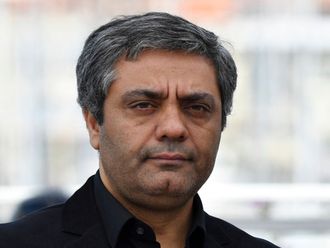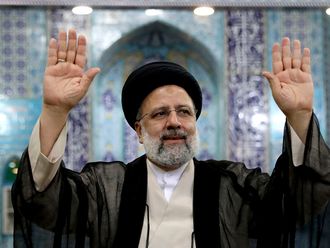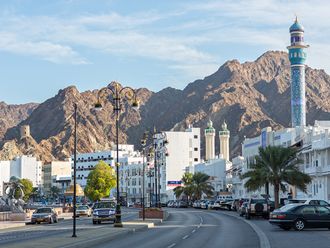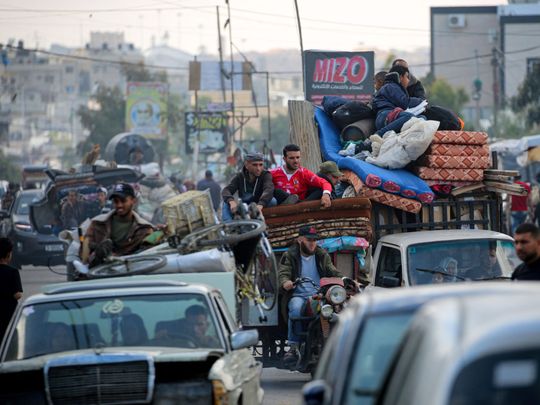
GENEVA: UN agencies said on Tuesday the two main crossings into the southern Gaza Strip remained shut, virtually cutting off the Palestinian enclave from outside aid with few stocks positioned inside.
The global agency’s humanitarian office spokesperson Jens Laerke told journalists Israel had shut both the Rafah and Kerem Shalom crossings for aid and people as part of its military operation in Rafah, where around 1 million uprooted people are sheltering.
The Israeli military said a limited operation in Rafah was meant to kill fighters and dismantle infrastructure used by Hamas, which governs the besieged Palestinian territory.
“The two main arteries for getting aid into Gaza are currently choked off,” Laerke said, adding U.N. agencies had very low stocks inside the Gaza Strip since humanitarian supplies were consumed immediately. The enclave has just a one-day buffer of fuel stocks, he said.
“If no fuel comes in for a prolonged period of time it would be a very effective way of putting the humanitarian operation in its grave,” he said.
A World Health Organization spokesperson said in response to a journalist’s question that no exceptions were being made for sick and injured patients.
While some non-fuel supplies have entered Gaza via the northern Erez crossing in recent days, the U.N. agencies said this was insufficient and difficult to deliver to Rafah since it meant crossing active combat zones.
“Erez will simply not be enough,” said James Elder, a spokesperson for the United Nations children’s agency. “If Rafah gate closes for an extended period, it’s hard to see how famine in Gaza can be averted,” he said.
The World Food Programme said later on social media platform X that its stocks would only last between one and four days for the southern and central parts of Gaza.
Even before the latest escalation in the seven-month-old conflict, the United Nations had repeatedly accused Israel of restricting aid access despite famine warnings. Faced with growing international pressure, Israel had pledged to improve access but says UN agencies are to blame for not distributing aid more efficiently within the enclave.
UN agencies said they had pre-stocked some aid within Rafah but said there were very low supplies of water and high-energy nutrition supplies needed to treat malnourished children.
Red Crescent sources in Egypt said shipments had completely halted.
“The Israeli occupation has sentenced the residents of the Strip to death,” said Hisham Edwan, spokesperson for the Gaza Border Crossing Authority.
The seizure of the Rafah crossing came despite weeks of calls from the United States, other goverments and international bodies for Israel to hold off from a big offensive in the Rafah area - said by Israel to be the last stronghold of Hamas fighters but also the refuge of more than one million displaced Palestinian civilians.
Many of the people now in Rafah were struggling to find a safe place to go in the tiny strip of land which has been bombarded almost non-stop since Hamas fighters stormed over the border into Israel on Oct. 7.
Families have been crammed into tented camps and makeshift shelters, suffering from shortages of food, water, medicine and other essentials. Aid agencies say famine is imminent as not enough food aid is reaching the enclave.
AIR STRIKES CONTINUE
Residents said Israeli tanks and planes also attacked several areas and houses in Rafah overnight on Monday and on Tuesday. The Gaza health ministry said Israeli strikes across the enclave had killed 54 Palestinians and wounded 96 others in the past 24 hours.
On Tuesday morning, people searched for bodies under the rubble of wrecked buildings.
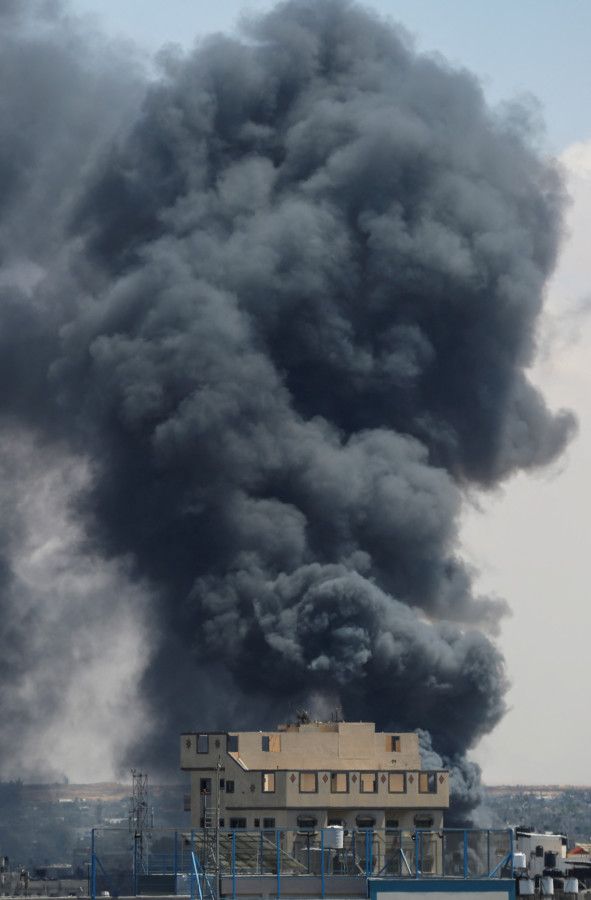
Raed Al Derby said his wife and children had been killed.
Standing in the street, anguish etched on his face, he told Reuters: “We’re patient and we will remain steadfast on this land.. We are waiting for liberation and this battle will be for liberation, God willing.” The Israeli military said a limited operation in Rafah was meant to kill fighters and dismantle infrastructure used by Hamas, which governs Gaza. It has told civilians to go to what it calls an “expanded humanitarian zone” around 20 km (12 miles) away.
Patients started to leave Abu Youssef Al-Najar hospital in east of Rafah after residents and some inside the hospital received phone calls telling them to evacuate areas designated by the Israeli army as a combat zone, medics and residents said.
‘IT’S NOT SAFE’
In Geneva, UN humanitarian office spokesperson Jens Laerke said “panic and despair” were gripping the people in Rafah.
He said that under international law people must have adequate time to prepare for an evacuation, and have a safe route to a safe area with access to aid. This was not the case in the Rafah evacuation, he said.
“It’s littered with unexploded ordnance, massive bombs lying in the street. It’s not safe,” he said.
A total of 34,789 Palestinians, most of them civilians, have been now killed in the conflict, the Gaza Health Ministry said.
The war began when Hamas militants attacked Israel on Oct. 7, killing about 1,200 people and abducting about 250 others, of whom 133 are believed to remain in captivity in Gaza, according to Israeli tallies.
UN Secretary-General Antonio Guterres appealed to Israel and Hamas to spare no effort to get a truce deal and warned Israel that a full assault on Rafah would “be a strategic mistake, a political calamity, and a humanitarian nightmare.”
Hamas said late on Monday it had told Qatari and Egyptian mediators handling the indirect talks that it had agreed to a ceasefire proposal but Israel said the terms did not meet its demands. On Tuesday, the militant group said Israel’s Rafah incursion was aimed at undermining the ceasefire efforts.
However, the various players appeared willing to talk again on Tuesday.
An official briefed on the talks said the Israeli delegation had arrived in the Egyptian capital Cairo, though Israel has reiterated its objective remained the destruction of Hamas.
A Palestinian official close to mediation efforts told Reuters a Hamas delegation may arrive in Cairo later on Tuesday or on Wednesday to discuss the ceasefire.
Any truce would be the first pause in fighting since a week-long ceasefire in November during which Hamas freed around half of the hostages and Israel released 240 Palestinians it was holding in its jails.
Since then, all efforts to reach a new truce have foundered over Hamas’ refusal to free more hostages without a promise of a permanent end to the conflict, and Israel’s insistence that it would discuss only a temporary pause.
A US State Department spokesperson said Washington believed a hostage deal was in the best interest of the Israeli and the Palestinian people.
“It would bring an immediate ceasefire and allow increased humanitarian assistance into Gaza,” the spokesperson said.


